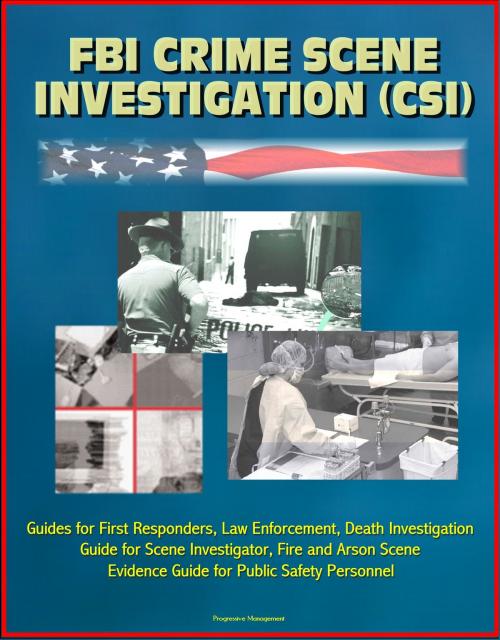FBI Crime Scene Investigation (CSI) - Guides for First Responders, Law Enforcement, Death Investigation Guide for Scene Investigator, Fire and Arson Scene Evidence Guide for Public Safety Personnel
Nonfiction, Social & Cultural Studies, Political Science, Politics, Law Enforcement, True Crime| Author: | Progressive Management | ISBN: | 9781301302031 |
| Publisher: | Progressive Management | Publication: | April 11, 2013 |
| Imprint: | Smashwords Edition | Language: | English |
| Author: | Progressive Management |
| ISBN: | 9781301302031 |
| Publisher: | Progressive Management |
| Publication: | April 11, 2013 |
| Imprint: | Smashwords Edition |
| Language: | English |
This is an authoritative ebook compilation of five major FBI documents on crime scene investigation:
Electronic Crime Scene Investigation: A Guide for First Responders - The Internet, computer networks, and automated data systems present an enormous new opportunity for committing criminal activity. Computers and other electronic devices are being used increasingly to commit, enable, or support crimes perpetrated against persons, organizations, or property. Whether the crime involves attacks against computer systems, the information they contain, or more traditional crimes such as murder, money laundering, trafficking, or fraud, electronic evidence increasingly is involved.
Crime Scene Investigation: A Reference for Law Enforcement Training - Thorough crime scene analysis is vitally important to effective law enforcement. In particular, rapid technological advances have greatly expanded the amount of information that can be obtained from the analysis of physical evidence from a crime scene. In order to take advantage of these new opportunities, the investigator should use sound scene processing practices to recover useful evidence. Critical to the administration of a crime is the objective recognition, documentation, collection, preservation, and transmittal of physical evidence for analysis.
Crime Scene Investigation: A Guide for Law Enforcement - Actions taken at the outset of an investigation at a crime scene can play a pivotal role in the resolution of a case. Careful, thorough investigation is key to ensure that potential physical evidence is not tainted or destroyed or potential witnesses overlooked. While many agencies have programs in crime scene processing, the level of training and resources available varies from jurisdiction to jurisdiction, as does the opportunity to practice actual investigation. To help these agencies, the National Institute of Justice supported the development of this guide.
Death Investigation: A Guide for the Scene Investigator - This revised and updated edition is the result of a collaborative effort to present the most up-to-date information about the issues confronting death investigators today. The death investigator is the eyes and ears of the forensic pathologist at the scene. It is hoped that these guidelines, reflecting the best practices of the forensic community, will serve as a national standard. Investigative Tools and Equipment * Exercise Scene Safety and Security * Confirm or Pronounce Death * Participate in Scene Briefing (With Attending Agency Representatives) * Conduct Scene "Walk Through" * Establish Chain of Custody * Follow Laws (Related to the Collection of Evidence) * Section C: Documenting and Evaluating the Scene * Section D: Documenting and Evaluating the Body * Section E: Establishing and Recording Decedent Profile Information * Section F: Completing the Scene Investigation
Fire and Arson Scene Evidence: A Guide for Public Safety Personnel - This Guide focuses on the documentation and collection of physical evidence at fire/arson scenes. Why Investigate Fires? * The Fire Problem in the United States * The Problem of Fire Investigations * Then Who Investigates Fires? * Establishing the Role of First Responders * Observe the Fire and Scene Conditions * Exercise Scene Safety * Preserve the Fire Scene * Establish Security and Control * Coordinate Activities * Section B. Evaluating the Scene * Introduce Yourself and Your Role as the Investigator * Define the Extent of the Scene * Identify and Interview Witnesses at the Scene * Assess Scene Security at the Time of the Fire * Identify Resources Required to Process the Scene * Section C. Documenting the Scene * Photograph/Videotape the Scene * Describe and Document the Scene * Section D. Processing Evidence at the Scene * Identify, Collect, and Preserve Evidence * Prevent Contamination * Package and Transport Evidence * Chain of Custody * Section E. Completing the Scene Investigation
This is an authoritative ebook compilation of five major FBI documents on crime scene investigation:
Electronic Crime Scene Investigation: A Guide for First Responders - The Internet, computer networks, and automated data systems present an enormous new opportunity for committing criminal activity. Computers and other electronic devices are being used increasingly to commit, enable, or support crimes perpetrated against persons, organizations, or property. Whether the crime involves attacks against computer systems, the information they contain, or more traditional crimes such as murder, money laundering, trafficking, or fraud, electronic evidence increasingly is involved.
Crime Scene Investigation: A Reference for Law Enforcement Training - Thorough crime scene analysis is vitally important to effective law enforcement. In particular, rapid technological advances have greatly expanded the amount of information that can be obtained from the analysis of physical evidence from a crime scene. In order to take advantage of these new opportunities, the investigator should use sound scene processing practices to recover useful evidence. Critical to the administration of a crime is the objective recognition, documentation, collection, preservation, and transmittal of physical evidence for analysis.
Crime Scene Investigation: A Guide for Law Enforcement - Actions taken at the outset of an investigation at a crime scene can play a pivotal role in the resolution of a case. Careful, thorough investigation is key to ensure that potential physical evidence is not tainted or destroyed or potential witnesses overlooked. While many agencies have programs in crime scene processing, the level of training and resources available varies from jurisdiction to jurisdiction, as does the opportunity to practice actual investigation. To help these agencies, the National Institute of Justice supported the development of this guide.
Death Investigation: A Guide for the Scene Investigator - This revised and updated edition is the result of a collaborative effort to present the most up-to-date information about the issues confronting death investigators today. The death investigator is the eyes and ears of the forensic pathologist at the scene. It is hoped that these guidelines, reflecting the best practices of the forensic community, will serve as a national standard. Investigative Tools and Equipment * Exercise Scene Safety and Security * Confirm or Pronounce Death * Participate in Scene Briefing (With Attending Agency Representatives) * Conduct Scene "Walk Through" * Establish Chain of Custody * Follow Laws (Related to the Collection of Evidence) * Section C: Documenting and Evaluating the Scene * Section D: Documenting and Evaluating the Body * Section E: Establishing and Recording Decedent Profile Information * Section F: Completing the Scene Investigation
Fire and Arson Scene Evidence: A Guide for Public Safety Personnel - This Guide focuses on the documentation and collection of physical evidence at fire/arson scenes. Why Investigate Fires? * The Fire Problem in the United States * The Problem of Fire Investigations * Then Who Investigates Fires? * Establishing the Role of First Responders * Observe the Fire and Scene Conditions * Exercise Scene Safety * Preserve the Fire Scene * Establish Security and Control * Coordinate Activities * Section B. Evaluating the Scene * Introduce Yourself and Your Role as the Investigator * Define the Extent of the Scene * Identify and Interview Witnesses at the Scene * Assess Scene Security at the Time of the Fire * Identify Resources Required to Process the Scene * Section C. Documenting the Scene * Photograph/Videotape the Scene * Describe and Document the Scene * Section D. Processing Evidence at the Scene * Identify, Collect, and Preserve Evidence * Prevent Contamination * Package and Transport Evidence * Chain of Custody * Section E. Completing the Scene Investigation















